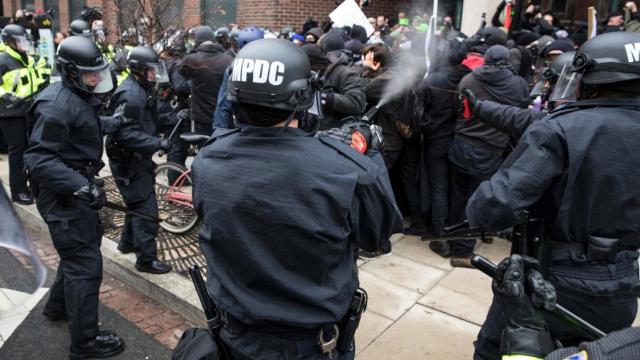
Police officers in Washington using pepper spray on protesters on Inauguration Day.CreditZach Gibson/Agence France-Presse — Getty Images
A year ago, I was finalizing plans to leave a chemical engineering Ph.D. program and join the tech sector. But as Inauguration Day approached, I became so disgusted by President-elect Donald Trump’s behavior that I felt it would have been negligent to remain a bystander. So I traveled from Baltimore to join hundreds of thousands of protesters at counterdemonstrations around Mr. Trump’s swearing-in.
Little did I know that I would be swept up into a legal nightmare that demonstrates how prosecutors intimidate and manipulate defendants into giving up their rights.
Minutes after I got to downtown Washington on Jan. 20, police officers used pepper spray, “sting-ball” grenades and flailing batons to sweep up an entire city block in a mass-arrest tactic known as “kettling.” I was among the more than 230 people confined at 12th and L Streets with no access to food, water or bathrooms for up to eight hours.
That much can be gleaned from public legal filings connected to our criminal prosecutions, as well as a lawsuit filed on behalf of me and three other plaintiffs by the American Civil Liberties Union. (One of this case’s many paradoxes is that I’ve been advised not to talk publicly about what happened before my arrest.)
Next, prosecutors at the United States Attorney’s Office in Washington took the highly unusual step of indicting more than 200 of those arrested. Most of the people in the group, which includes journalists, legal observers and volunteer medics, face charges of engaging in a riot, inciting a riot, conspiracy to riot and property damage. In addition to seizing the contents of at least 100 cellphones, prosecutors secured broad warrants for Facebook pages and records relating to a political organizing website.
Throughout this disruptive legal adventure, the government has failed to provide most defendants in the case with evidence of their alleged individual wrongdoing. For example, I was offered a plea deal (to a single misdemeanor charge) on the basis of virtually nothing more than being at the site of the protest. Many of my co-defendants report similar experiences. Yet we remain under indictment for multiple felonies, with all the disruption and fear that brings.
As these cases have progressed, I have been trapped in a liminal state — between careers, away from my home city, weighed down by constant uncertainty about the future — for nearly a year. I have to be present for the many hearings, which, for financial reasons, has required me to live in Washington.
And this serves to illustrate a critical problem in the American justice system: Prosecutors have the power to single-handedly destroy lives, and there are few consequences for abuse of that power. At the same time, their main measure of success is the ability to secure convictions, not the degree to which justice is served.
The trouble starts with the indictment process, in which prosecutors present their case to a grand jury in secret, without any opposing viewpoint, and get what they ask for a vast majority of the time. Most indictments end in a plea deal, bypassing the oversight of a judge and jury. Prosecutors also dictate the terms of these somewhat Faustian bargains, often pursuing excessive charges as a form of intimidation. If you’re innocent, you are faced with the choice of a lifelong criminal record or the heavy social and financial burdens that come along with due process.
To further complicate the ethics of a plea-based justice system, prosecutors can use family members as tools to extract pleas. In my case, I was arrested along with my fiancé, and the “evidence” presented against us was similar. In hopes of securing two convictions rather than one, prosecutors told us that our plea deals were contingent on convincing the other to plead out.
Unlike more than 90 percent of criminal defendants in this country, my co-defendants and I have chosen to take our cases to trial. I can’t speak to all of their motives, but I was unwilling to capitulate to a system dominated by petty tyrants willing to win at any cost.
But more important, this is no isolated injustice from an unusually malicious prosecutor. Similar stories play out across America, often in communities where people lack access to adequate legal assistance, or the personal resources to fight a protracted legal battle. It’s time for us to confront the true implications of our society’s promise that we are innocent until proven guilty.
3 WAYS TO SHOW YOUR SUPPORT
- Log in to post comments











